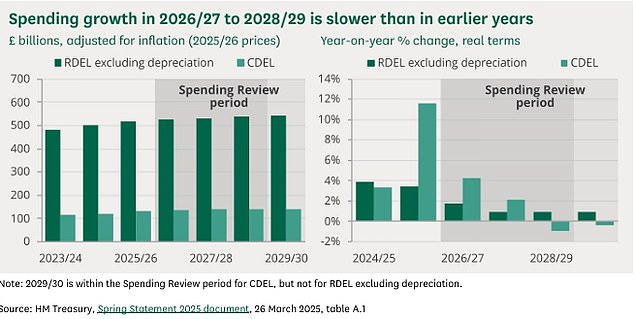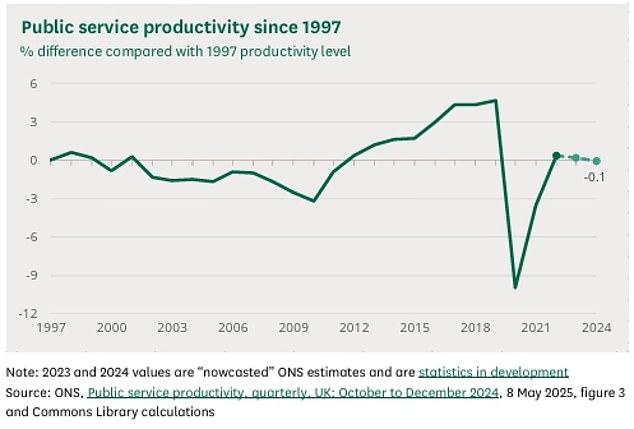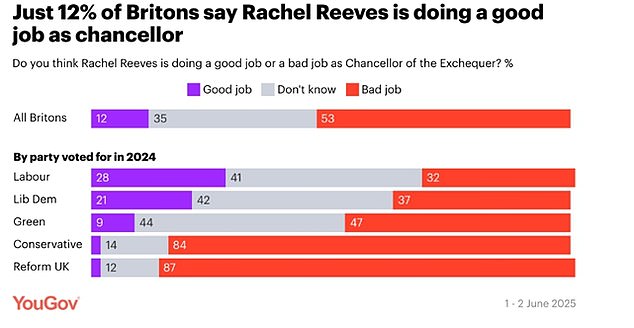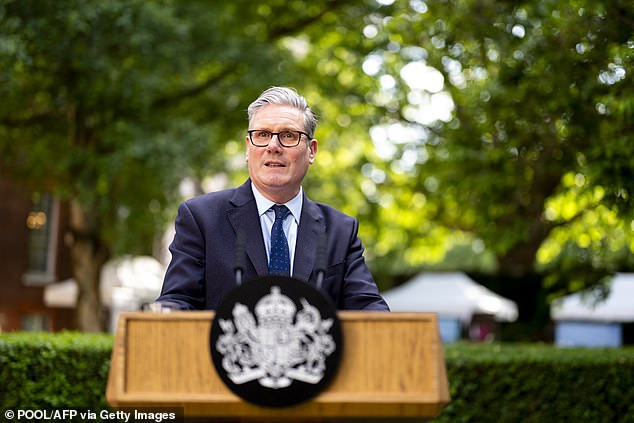Rachel Reeves will splash the cash today as fears mount that Brits will need to pick up the bill later.
The Cabinet is set to sign off the spending review before the Chancellor announces the details in the Commons at lunchtime.
She will allocate huge sums to departments for the coming years, after loosening the government’s borrowing rules at the last Budget.
But although Ms Reeves will boast that her new approach means Labour can spend a staggering £300billion more over the next five years than the Tories planned, critics have warned she does not know where the money is coming from.
The generous fiscal envelope set last Autumn has been put under massive pressure by the economy slowing down and Donald Trump‘s trade war.
There are demands to pump far more cash into defence, while Ms Reeves has already made an humiliating U-turn on winter fuel allowance cuts and is facing a Labour revolts on other benefits curbs.
That has led analysts and political rivals to argue that more tax increases are ‘inevitable’ – although the funding gap will not crystalise until the next fiscal package.
The tax rises in the Budget last year were the biggest on record for a single fiscal event.

Rachel Reeves will splash the cash today as fears mount that Brits will need to pick up the bill later

The Chancellor will allocate huge sums to departments for the coming years, after loosening the government’s borrowing rules at the last Budget

Public sector productivity has been making almost no progress despite investment
The backdrop to the decisions has been looking increasingly grim, with Labour trailing Reform in the polls. Figures yesterday showed unemployment rising, and a survey found just 12 per cent of Brits believe Ms Reeves is doing a good job.
Ministers have described the spending plans – equal to an extra £8,100 for every taxpayer in Britain – as ‘the end of austerity’.
In her announcement later, Ms Reeves will admit voters do not feel like they have more money in their pockets as Labour prepares to mark one year in office.
But she will insisting she is ‘renewing Britain’. ‘This Government’s task – my task – and the purpose of this spending review is to change that, to ensure that renewal is felt in people’s everyday lives, their jobs, their communities,’ she will say.
Last week, Ms Reeves refused to rule out any further tax increases.
Spending will be skewed heavily towards the NHS in an attempt to cut waiting lists further.
Defence is set to be another big winner after Sir Keir Starmer committed to spending 2.5 per cent of GDP by 2027.
Allies of Angela Rayner were last night claiming victory in her bid to secure more cash towards meeting Labour’s target of building 1.5 million new homes by the next election.
The Deputy PM, who is responsible for housing policy, had a series of bust-ups with Treasury ministers and No 10 over the issue.
The Treasury had proposed a modest increase in the social housing budget from £2.3billion a year to £2.5billion. But government sources last night said Ms Rayner had secured a £39billion settlement over ten years.
The Treasury said it was the biggest boost to social housing in a generation.
But the growing cost of servicing the UK’s debt mountain means other areas of spending, including the police, face a budget squeeze in future years.
The Tories branded Ms Reeves the ‘Spend Today, Tax Tomorrow Chancellor’.
Shadow chancellor Mel Stride said: ‘Labour is spending money it doesn’t have, with no credible plan to pay for it.
‘That means more borrowing, more debt, and, inevitably, more tax rises in the Autumn Budget. Don’t be fooled. We can’t afford Labour.’

A survey has found just 12 per cent of Brits believe Ms Reeves is doing a good job

The Chancellor and Prime Minister (pictured) have repeatedly claimed that Labour has ‘fixed the foundations’ of the economy, despite rising inflation and cuts to official growth forecasts
In recent days, the Chancellor and Prime Minister have repeatedly claimed that Labour has ‘fixed the foundations’ of the economy, despite rising inflation and cuts to official growth forecasts.
Yesterday’s stark employment figures underline the real-world impact of Labour’s tax and spend approach. They revealed UK payroll numbers have shrunk by 276,000 over the past seven months. In May alone, payrolls fell by 109,000 – the worst month since the pandemic.
Meanwhile the unemployment rate has climbed to 4.6 per cent, the highest in nearly four years.
Experts pinned the blame on Ms Reeves’s £25 billion raid on employer National Insurance, which was announced in the October Budget and took effect in April. Payroll numbers fell every month since the Budget.












